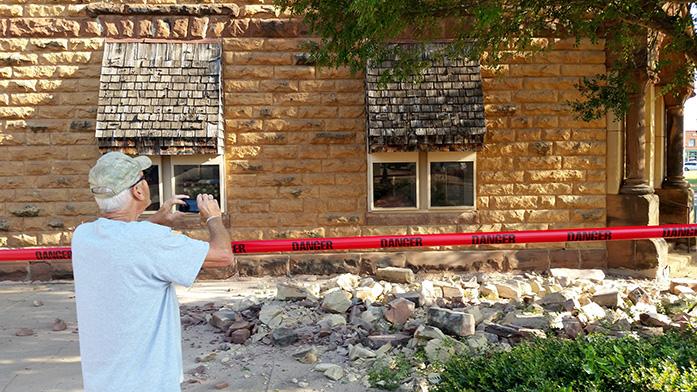By Emily Van Kirk
Oklahoma experienced a 5.6 magnitude earthquake on Sept. 3, likely resulting from fracking practices. The earthquake could be felt through central Iowa. As a result, 37 hydraulic-fracture wells have been shut down by Oklahoma state regulators.
It is a knee-jerk reaction to close wells immediately after an issue occurs. Ceasing fracking limits a resource that can decrease energy reliance and eventually transition America to sustainable energy production.
A New York Times Op-Ed regarded “the anti-fracking rhetoric” as “rooted in the assumption that liberalism is as inherently antithetical to fracking as it is, say, to the Defense of Marriage Act — or monarchy.” The article went on to find “liberalism and fracking to be completely compatible.”
Although fracking poses environmental risks, fracking also provides a series of benefits that commonsense liberal climate activists can reasonably support.
First, natural gas, produced from fracking, yields the same output as coal while emitting half the amount of carbon into the atmosphere. No carbon release is good, but fracking provides a segue from detrimental fossil-fuel outputs toward increasingly sustainable energies.
Next, releasing and harnessing natural gas from shale reservoirs in the U.S. has led to decreases in energy prices. In the past, America has sought petroleum from Persian Gulf states, Canada, Mexico, Venezuela, and Russia.
Petro-states in the Gulf namely, Saudi Arabia are autocratic and routinely commit human-rights abuses against their residents. Mexico is ridden with corruption and drug cartels, and the Venezuelan president is hugely unpopular after massive food shortages and hyperinflation. Russia continues to make inroads into former Soviet satellite nations as President Vladimir Putin solidifies his regime.
These nations we have in the past relied on for petroleum do not support our American values. Increased domestic production of natural gas reduces U.S. carbon emissions and also limits financial support for undemocratic, human-rights abusing, energy-producing regimes abroad.
Fracking is a safe and environmentally conscious energy source, which will serve the current times well. Hydraulic fracking is not the sole source of energy for Americans, nor should it be, but shale wells will transition America to an increasingly sustainable future, one that is also financially feasible.
Ideally, America would initiate an immediate transition toward sustainable energies. This is the platform approach of Green Party presidential candidate Jill Stein. Unfortunately, renewable-energy reliance is not yet a full reality.
The environmental consequences of natural-gas and carbon emissions cannot be ignored. Ultimately, further fracking practices would require increased regulation and changes to the Clean Water Act. These adjustments would limit problems associated with fracking, such as groundwater contamination and earthquakes, as was seen in Oklahoma.
Groundwater reserves provide airable land to Iowa farmers. Contamination risks that result from fracking can be avoided with increased regulation under the Clean Water Act. Earthquakes have only become a problem in a miniscule fraction of the total shale wells across the country. Overall, if hydraulic-fracking companies are forced to abide by stricter regulation, the risks associated with fracking will be further lessened.
Oklahoma’s immediate response to the earthquake has initiated closures of shale wells. Natural gas is beneficial to the American economy, U.S. interests overseas, and a sustainable future. For this reason, America needs to continue investing in safe fracking practices.










